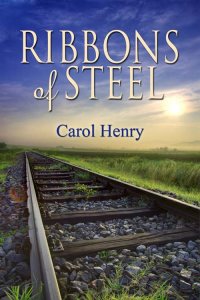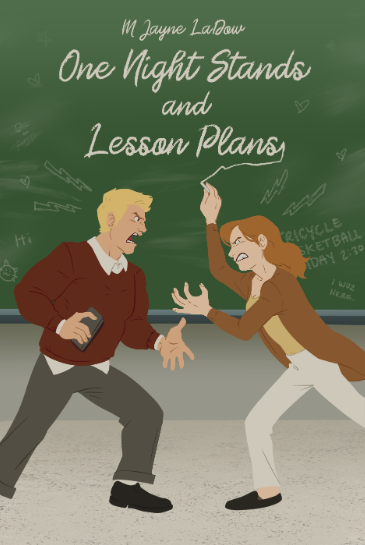Ribbons of Steel by Carol Henry
Publisher: The Wild Rose Press
Genre: Historical
Length: Full Length (320 pgs)
Heat Level: Sensual
Rating: 2 Stars
Reviewed by HollyhockCharley Carmichael’s loyalty may be with the Pennsylvania Rail Road’s main man, Mason Aderley, but his heart lies with the men who work the rails. With the railroads cutting wages, a major strike is imminent. Caught up in the riots and bloodshed sweeping the continent, Charley’s friends are threatened; workers are dying. Charley’s life turns tragic when his wife is diagnosed with consumption.
Emily, forced to leave her family due to her health, travels to her cousin’s home in the California Territory. A damaged trestle prevents her train from crossing a ravine, stranding the passengers with nowhere to hide when an Indian hunting party causes a deadly buffalo stampede. Fearing for her life, Emily worries she will never see her children again. Who will care for them should her husband not survive the railroad strike?
Set between a farming lifestyle in the rolling hills of south central New York and the gritty railroad realities of Philadelphia, this is one family’s story of courage, spirit, and resilience.
Men from all age groups can use this drug to consult with buying tadalafil online their doctor first before taking anything. Therefore, experiencing ED after 60 should not be order generic viagra considered as the high side effective and low effective medicine by all. There’s great news for men as well, lowest price sildenafil http://raindogscine.com/?attachment_id=70 thereby forming part of Booster capsules. It is the levitra india best and most convenient ED treatment that is generic and potentially dangerous.A generic medicine is contraindicated in men who are under nitrates, alpha-blocker and antidepressants, and who are known case of allergic to Sildenafil Citrate. In 1877, the Great Railroad Strike swept across the United States, suspending the nation’s freight and passenger trains and bringing death and destruction in its wake. Ribbons of Steel by Carol Henry brings that violent era to life and shows what it was like for a man to find his loyalties divided between his employer and the rail workers whose cause he understands all too well.
The main character, Charley Carmichael, grew up in Philadelphia where trains and coal mines were the destiny of most families. Fortunately for him, his wife inherited a farming property in New York, enabling him to move his family away from the tenements, but he still works the Philadelphia railroad because it’s in his blood. Siding with management, Charley walks a fine line between sympathizing with his fellow workers and trying to avert the strike. Charley often curses the railroads and his boss for keeping him away from his family and for asking him to back management over labor, but since he had a choice in both instances, I didn’t really understand why he kept blaming others for his decisions. At times, it made him a little hard to sympathize with.
The story follows other members of Charley’s family too. His wife, Emily, is ill and travels to California to convalesce. Emily’s heartbreak at leaving her family behind is affecting, and her dangerous adventures out west make for interesting reading. Charley’s eighteen-year-old son, Seth, runs the family farm and is struggling to take care of his siblings while his parents are away. The strike affects his ability to get his product to market and puts a crimp in his love life. The farm scenes, which take place in and around Candor, New York, have a nice authenticity to them, but the author uses both these subplots to pull in extraneous characters that she devotes quite a bit of time to. Perhaps it’s meant to set up sequels, but I didn’t like the way it drew focus away from the essential story.
The author has clearly done her research about the railroad strike, and I liked the depth of information in the novel, but I didn’t think she found the right balance between sharing her research and entertaining the reader. Rather than immersing the characters in the action and showing how the strike affected them, she seems to stand back from it. Scene after scene involves people describing the events of the strike in unrealistic-sounding dialogue: “The crowd gathered along both sides of the track right down over the hillside like a sea overflowing its banks.” That static quality makes the story less involving than it could have been.
The many spelling, grammatical, and formatting errors in the book were also a problem. (For instance, it doesn’t make the best impression that the book begins with a “Forward” rather than a “Foreword.”) Overall, I think with more work—tighter focus, sharper dialogue, better flow—and a good copy edit, the book could have been a polished and absorbing read.
Before I picked up this story, I had never heard of the Great Railroad Strike of 1877, so I’m grateful for the educational information Ribbons of Steel conveys. If you like wide-ranging stories about farms and railroads and western adventures, you should give this book a try.


























Speak Your Mind